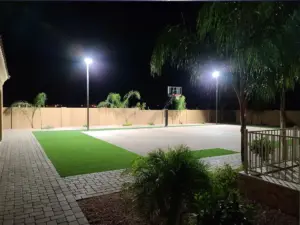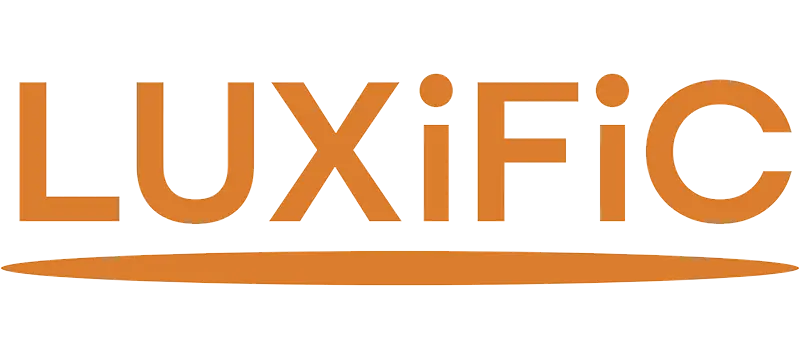Introduction:
Outdoor basketball court lighting design is essential to ensure optimal visibility. It is also necessary for the player’s and spectators’ performance and safety. Proper lighting enhances the overall experience. It allows games to be played effectively during various weather conditions. Here’s a comprehensive guide to help you design an efficient outdoor basketball court lighting system.
Outdoor Basketball Court Lighting Design

1. Understand Lighting Requirements
Understanding the specific lighting requirements of outdoor basketball courts with lights is fundamental. It helps to create an effective lighting design. The court size, usage, and the type of games being played are critical factors. Larger courts may require more fixtures and higher light levels. The Lighting Research Center provides recommended foot-candle (fc) values. They are based on the type of play: 50-75 fc for recreational play and 75-200 fc for competitive play. These guidelines serve as a starting point for the design process.
2. Choose the Right Lighting Fixtures

Selecting the appropriate lighting fixtures is crucial for achieving the desired lighting levels. It also ensures energy efficiency. LED lighting fixtures are widely favored for outdoor sports. They are the best lighting for outdoor basketball court. This is due to their high efficacy and long lifespan. They also have the ability to provide consistent and bright lighting. LED fixtures are energy-efficient, resulting in lower operating costs and reduced environmental impact. Additionally, they offer options for customizable light distribution. This enables optimal light spread across the court.
3. Determine Mounting Heights
Determining the appropriate mounting heights for outdoor basketball court lights fixtures is vital. It helps achieve uniform illumination on the basketball court. Mounting heights typically range from 20 to 40 feet. It depends on the specific court dimensions. The fixtures should be mounted at a height that minimizes glare and shadows. They should also ensure adequate coverage and visibility across the entire court area.
4. Plan Fixture Layout
The layout of outdoor basketball courts with lights fixtures is a critical aspect of designing. The goal is to achieve uniform lighting. It shouldn’t create dark spots or areas with excessive brightness. Use a combination of pole-mounted and court-edge-mounted fixtures. They can be strategically placed to eliminate shadows and minimize glare. Proper fixture placement and alignment will ensure that players have optimal visibility. It enhances their performance and safety on the court.
5. Implement Lighting Zones
Dividing the court into lighting zones in outdoor basketball court lighting design helps. Areas such as the key, three-point line, and basket may require higher lighting levels. It is for optimal visibility during critical plays. Creating different zones allows for fine-tuning the lighting is good. It helps meet the specific needs of each area. It optimizes the playing experience for the participants.
6. Optimize Lighting Angles
Optimizing lighting angles is essential to ensure that the light is directed precisely. It has to be where it’s needed on the court. By aiming the fixtures towards the center of the court, you can achieve best lighting for outdoor basketball court. It minimizes shadows and glare. This strategic approach enhances the quality of illumination. It also supports players in making accurate shots and passes.
7. Incorporate Controls and Dimming
Integrating lighting controls and dimming systems offers flexibility and efficiency. It helps you manage the lighting levels based on different game requirements and time of day. Advanced controls enable programming pre-set lighting scenarios for various events, allowing for energy savings during non-peak usage. Dimming capabilities enable fine control over the lighting. It is useful for adjusting the lighting to different game intensities or events.
8. Address Glare and Light Pollution
Glare and light pollution can be disruptive and hazardous. This is not only to the players but also to the surrounding community. Utilize fixtures with proper shielding and optics to reduce glare and control light spillage. Outdoor basketball court lighting design with shielded fixtures directs light downwards onto the court. It minimizes upward light and prevents light trespass into neighboring areas. This ensures that the lighting system remains efficient. This also makes sure it’s safe and considerate of the environment.
9. Ensure Compliance with Standards
Adhering to lighting standards and regulations is crucial to designing a lighting system. It should meet the necessary criteria for safety, performance, and energy efficiency. The Illuminating Engineering Society of North America (IESNA) provides guidelines and recommendations. These guidelines specify outdoor basketball court lighting standards. They help designers ensure that their outdoor basketball courts with lights designs follow industry-accepted standards.
10. Consider Environmental Impact
Environmental considerations are increasingly important in modern lighting design. Opt for energy-efficient lighting solutions to minimize the carbon footprint of the facility. Explore the possibility of integrating renewable energy sources. For example, sources such as solar panels to power the lighting system. This reduces operational costs. It also contributes to a more sustainable and environmentally friendly lighting design.
11. Perform Photometric Analysis
Before finalizing the lighting design, conduct a thorough photometric analysis. It is to simulate the lighting distribution on the basketball. Use specialized software to model the fixtures, their placement, and light output. It will help confirm that the proposed lighting design meets the foot-candle levels. It also helps define its uniformity and other specific lighting requirements of outdoor flood lights for basketball court.
12. Budget and Cost Analysis
Developing outdoor basketball court lights budget is a critical step in the design process. Consider the costs associated with lighting fixtures, installation, and electrical infrastructure. Also, consider controls and ongoing maintenance. Conduct a detailed cost analysis to ensure that the design aligns with the budget. It should provide the best value for the investment.
13. Installation and Maintenance
Engage professional lighting installers and contractors with experience in outdoor basketball court lighting design. Proper installation is crucial to ensuring the lighting system operates efficiently and safely. Additionally, establish a routine maintenance schedule. It is to inspect and maintain the lighting fixtures, wiring, and control systems. Regular maintenance enhances the system’s longevity, performance, and energy efficiency.
Basketball Court Lighting Design FAQs

1. What are the key considerations when designing outdoor basketball court lighting?
When designing outdoor basketball court lighting, include several key considerations. Like understanding lighting requirements (such as foot-candle levels), and choosing energy-efficient LED fixtures. Also, determine appropriate mounting heights. Optimizing fixture layout for uniform illumination and incorporating controls for efficiency will help.
2. How do I calculate the appropriate lighting levels for an outdoor basketball court?
To calculate the appropriate lighting levels (measured in foot-candles) consider the court’s size. Also, purpose (recreational or competitive), and the type of games played. The Lighting Research Center provides recommended foot-candle values. Additionally, consulting with a lighting professional is good. Using lighting calculation software can also help. This way determines precise lighting requirements based on the court’s specifics.
3. What are the advantages of using LED fixtures for outdoor basketball court lighting?
LED fixtures are preferred for outdoor basketball court lighting due to their high energy efficiency. They also have a long lifespan, customizable light distribution, and consistent brightness. They offer energy savings and reduce operational costs. Finally, they provide better lighting quality compared to traditional lighting technologies.
4. How can glare and light pollution be minimized in an outdoor basketball court lighting design?
Glare and light pollution can be minimized by using fixtures with proper shielding and optics. They direct light downward onto the court and prevent light spillage. Ensuring the correct lighting angles and well-designed fixtures can reduce glare. and light pollution, creating a safer and more enjoyable playing environment.
5. What role do lighting controls play in an outdoor basketball court lighting system?
Lighting controls offer the ability to adjust light levels based on specific requirements, game intensity, or time of day. This includes dimming features and the ability to program lighting scenarios. Controls enhance energy efficiency and extend fixture lifespan. They also allow for optimizing both player performance and energy savings.
6. How can I ensure compliance with lighting standards for an outdoor basketball court?
To ensure compliance with outdoor basketball court lights standards, refer to guidelines provided by reputable organizations. For example you can use guidelines from Illuminating Engineering Society of North America (IESNA). These standards outline recommended lighting levels, uniformity, and glare control. They are for outdoor sports facilities for creating compliant lighting designs.
7. What are the benefits of conducting a photometric analysis for the lighting design?
A photometric analysis uses specialized software. It simulates and validates the proposed lighting design. This helps visualize the light distribution. It helps confirm whether lighting levels meet requirements or not. It also ensures uniform illumination across the court. This analysis allows for adjustments before installation. This is how you can ensure an effective and efficient lighting system.
8. How can I maximize the energy efficiency of an outdoor basketball court lighting system?
Maximizing energy efficiency involves selecting LED fixtures. Do not forget to implement lighting controls and optimize fixture layout. Use efficient optics and alternative energy sources such as solar panels. Regular maintenance and monitoring are also essential to the system for peak efficiency.
Conclusion:
Designing an effective outdoor basketball court lighting system requires careful consideration. It involves various factors, including lighting requirements, fixture selection, and mounting heights. Also, follow the fixture layout, and keep in place the required controls. By paying attention to design process, you can create a well-lit, safe, and energy-efficient environment. It would be great for basketball players and spectators to enjoy the game, day or night. Implementing the right lighting design will ultimately enhance the overall basketball experience.
